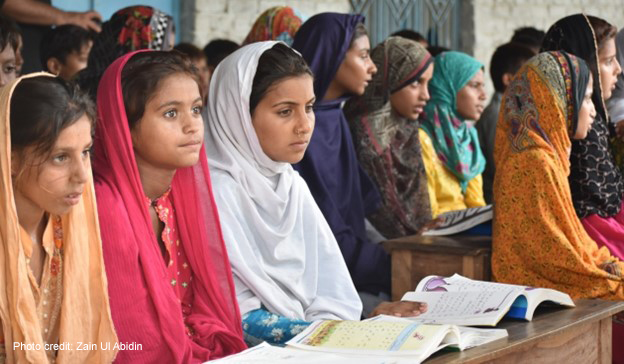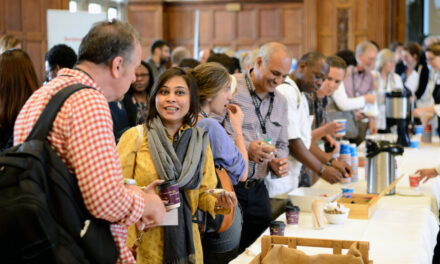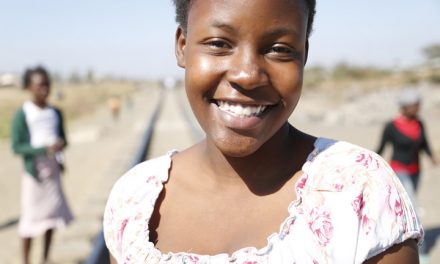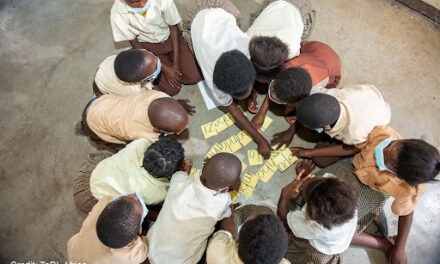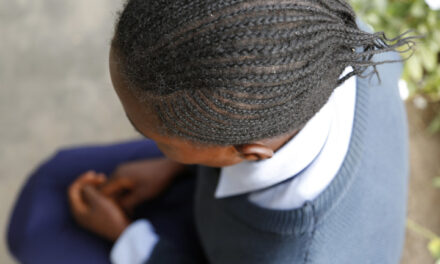This blog was written by Zain Ul Abidin, Data Analyst (University of Glasgow), in collaboration with Baela Jamil, Saba Saeed and Muhammad Fida Hussain (Idara-e-Taleem-o-Aagahi-ITA). Zain has interests in education policy, systems research, education globalisation, girls’ education, equality, diversity and inclusion. His dedication to educational equality, particularly through his work on the second chance programme with Idara-e-Taleem-o-Aagahi, was recently recognised as one of the top 100 education innovations by HundrED.org. For the 2023 UKFIET conference, 28 individuals, including Zain, were provided with bursaries to assist them to participate and present at the conference. The researchers were asked to write a short piece about their research or experience.
The 2023 UKFIET Conference theme “Education for Social & Environmental Justice: Diversity, Sustainability, Responsibility“, could not have chosen a more pertinent set of aspirations for the purpose of education. At its heart, social justice emphasises equal access to liberties, rights and opportunities for the most marginalised members of society. When discussing education in the context of social justice, the emphasis is placed firmly on equitable access to education and learning, irrespective of gender, socioeconomic background, or geographical location. It is in this very framework that the significance of girls’ education in Pakistan becomes paramount.
If a nation’s wealth were to be judged, it would not be by its gold reserves, sprawling cities or technological prowess. Instead, it would be by its human capital – the skills, talents and potential of its people. Education is the primary tool through which human capital is cultivated and enhanced. For Pakistan, a nation bursting with young potential, the lack of equal educational opportunities, especially for girls, represents a vast reservoir of untapped potential. With 12 million girls out of school and over 80% of children unable to comprehend simple text by age 10, the country is inadvertently sidelining a significant portion of its potential future leaders, innovators, and change-makers.
Girls’ education, particularly in regions like Pakistan, is not just an educational issue; it’s a multi-dimensional challenge intersecting with culture, economics and societal norms. Deep-rooted customs, economic constraints and gendered expectations often deter families from sending their daughters to school, thus denying them their fundamental right to education. These challenges are further compounded by external crises like the COVID-19 pandemic, which has disproportionately affected girls, pushing many further away from academic and future professional opportunities.
Such a scenario does not just signify missed educational opportunities; it hints at broader societal implications. Research indicates that out-of-school girls often manifest low human capital and have limited visibility in the labour force (e.g. 22% in Pakistan). The broader ramifications of this trend on societal progress and economic growth are evident.
Amidst the staggering challenges faced by girls seeking education in Pakistan, second-chance programmes like Advancing Action for Adolescent Girls (A3G) – Siyani Sahelian (SS) emerge as beacons of hope. These initiatives, including those under the Girls Education Challenge , supported by FCDO and partner governments, recognising the multifaceted nature of the crisis, strive not merely to reintegrate girls into the academic sphere but also to dismantle the cultural, economic and societal barriers impeding their progress. More than just offering a return to education, they grant these girls a renewed opportunity for a brighter, capability driven and empowered future.
Siyani Sahelian, which translates to “wise friends”, is a second-chance programme tailored for out-of-school adolescent girls aged 9-19, founded and implemented by Idara-e-Taleem-o-Aagahi (ITA)/Centre of Education and Consciousness. Gaining recognition as one of the top 100 innovations from over 3,000 global initiatives, the programme speaks directly to the more than 135 million out-of-school adolescent girls worldwide. The target demographic of SS primarily hails from the economically-challenged districts of South Punjab, an area known for deeply-rooted feudal customs and prevalent gender disparities.
These girls, due to a multitude of reasons including poverty, early marriages, disability and religious exclusions, often find themselves marginalised, making them the perfect candidates to champion gender equality through customised education and empowerment strategies.
Program highlights and partnerships
SS’s structure is holistic and comprehensive. It integrates:
- Foundational learning/TaRL: A 2-3 month catch-up programme focused on foundational literacy and numeracy skills.
- Remedial education and accelerated learning opportunities: A roadmap for girls to complete primary, middle or matric level education.
- Life skills training: Focusing on nine core areas encompassing holistic development.
- TVET and entrepreneurship: Providing certified vocational training coupled with entrepreneurial skills, financial inclusion fostering economic independence.
With ITA and Sharmeen Obaid Chinoy (SOC) Films collaborating to create easily accessible life skills content in multiple local languages, the programme amplifies its reach and resonance. Furthermore, the initiative has successfully partnered with other organisations like HerGround for menstrual and health management skills and CIRCLE Women for certified digitally-inclusive vocational training.
Digital inclusion remains a critical component, with 2,000 middle grade students benefiting from the British Council’s English and Digital Girls Education (EDGE) programme, solidifying SS’s stance on equipping the most marginalised girls for the modern world. With commendations from institutions like HundrED Academy, which noted the commitment of the SS team, it is evident that with the right intent and dedication, transformative change is attainable for adolescent girls.
“With the tenacity and commitment of this organizing group and leaders there is no doubt that this program will spread near and far throughout the country. Their commitment to improving education for all is contagious and will impact and influence.” (HundrED Academy Review)
Many beneficiaries of SS were previously labeled as ‘under primary, under middle, and under matric’ drop-outs, essentially rendered invisible in academics and society. However, with the SS programme’s intervention, these girls were provided with an enabling opportunity to complete their stages of education at primary, middle and secondary levels with life skills and to rewrite their narratives. While the challenges girls face in accessing education in regions like feudal patriarchal landscapes of South Punjab are significant, the SS programme demonstrates that with a combination of holistic academic and non-academic skills, innovation, resilience and adaptability, these challenges can be overcome. Remarkably, even the global COVID-19 pandemic could not halt the programme’s momentum.
The unforeseen challenges brought about by the pandemic were felt worldwide, but for many educational initiatives, it meant a complete halt. However, SS was quick to pivot, ensuring not a single day was wasted. By transitioning to hybrid learning methods, using WhatsApp, SMS, TV broadcasts, and face-to-face sessions (where safe), SS showcased its commitment to continuous learning. This adaptability, combined with the support of dedicated community facilitators, ensured that the girls’ education remained uninterrupted.
Evidence from various research studies and renowned evaluations reveal the transformative power of the A3G programme. In the realm of numeracy, a phenomenal shift was observed: from just 1% of girls recognising 3-digit numbers at the outset to a remarkable 100% being able to recognise 3-digit numbers by the programme’s end, with 47% also achieving proficiency in double-digit division. Literacy, both in English and Urdu, further substantiated these gains. Initially, a majority of the girls were at the ‘Beginner’ reading level in both languages. By the end of the programme, a staggering 91% exhibited competence in reading English sentences, and 60% gained competency in comprehending Urdu stories. This meteoric rise in academic competencies parallels the girls’ burgeoning self-perception. The data highlighted a marked increase in self-reliance beliefs, confidence in decision-making across various life spheres, and heightened awareness of women’s rights. Delving into the socio-economic backgrounds of these girls, the data indicates that just 15% of their mothers and 23% of fathers have had formal education, painting a clear picture of the uphill challenges they face. Yet, intriguingly girls whose fathers have no formal education are almost 20 percentage points more likely than those whose fathers are educated to have made progress from baseline to end line in mother language literacy. Such revelations highlight the programme’s effectiveness in transcending socio-economic barriers.
Endorsed by international experts like the Development Director at FCDO Pakistan, the SS programme has gone beyond mere academics. It has become a sanctuary, a space of empowerment where these young girls can share their stories, voice their concerns, and be genuinely heard.
“The energy of Siyani Sahelian is just enormous. The programme is full of young people and young women with hopes and dreams which are much more likely to be realised because of all the things they are learning here. It’s so imperative that they have an environment where they can fully flourish and thrive and can make the most of the potential, to which they have been naturally gifted.” (Annabel Gerry – Development Director Pakistan – FCDO)
The impact is tangible. From being girls who were once confined to their communities, they’ve now started engaging in public forums, speaking alongside officials and policymakers. They’ve been transformed into ambassadors of education and members of the GEEA (Girls’ Education and Enterprise Alliance), voicing their aspirations with unparalleled grit and confidence. Furthermore, the programme’s focus on early foundational learning, combined with regular assessments aligned with student learning outcomes, has witnessed immense success. Over the span of four years, from 2018-2022, SS has benefited 50,000 adolescent girls in districts of South Punjab and Lahore. This monumental success is also attributed to support from organisations like FCDO, the Malala Fund and UNESCO.
The A3G initiative has yielded impressive outcomes. External evaluations by renowned research groups revealed the transformative power of non-cognitive life skills in achieving academic success for these girls. A striking 92% success rate was observed when the girls appeared for official board exams for primary and middle grades, and a huge number of 13,000 out-of-school girls transitioned into formal schools. For older adolescents, over 9,000 have completed certified TEVT, encompassing both traditional and modern trades including digital skills. Such achievements underscore the programme’s efficacy, versatility of offerings for a range of age groups (9-19 years), agency and commitment.
Testimonies from beneficiaries, like Mehnaz Rafique, highlight the programme’s impact at a personal level. From being deprived of basic education, they now harbour dreams of empowering others, showcasing the ripple effect of the SS initiative.
“Today I can proudly say that I can also, thrive and learn and one day will definitely achieve my dream of becoming a teacher and will facilitate the girls in the same way who don’t have access to basic education and learning in their villages.” (Mehnaz Rafique a primary grade student from Jhangar Mahra, Muzaffargarh, South Punjab)
Having successfully demonstrated its efficacy, the SS programme model reaching out to more than 40,000 adolescent girls is geared towards replicability and scalability. With a comprehensive toolkit adaptable to various contexts, it upholds principles of participation, foundational learning, and socio-emotional growth. While its roots are in South Punjab, the programme’s core components are versatile enough for implementation across Pakistan, ensuring that no child, be it from conflict-ridden, excluded or disaster-struck areas, remains deprived of education.
As the Siyani Sahelian programme showcases, with the right strategies, partnerships, evidence and determination, the dream of universal education, especially for girls in challenging regions, is not just possible, but achievable.

